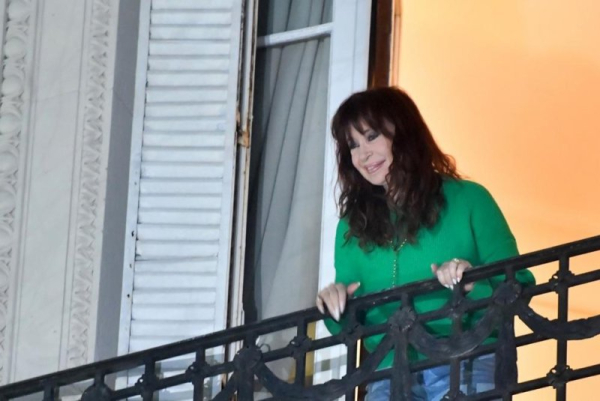

Argentina’s former president, Cristina Fernández de Kirchner, stands on the balcony of her home in Buenos Aires in June at her home, where she has been serving a six-year prison sentence. File Photo by Martin Quintana/EPA
A federal court in Argentina ordered the seizure of 20 properties belonging to former President Cristina Fernández de Kirchner and her two children, Máximo and Florencia.
Authorities say the assets were obtained through corruption and the improperly awarding state public-works contracts.
The measure seeks to recover about $500 million identified as losses to the state from contracts approved during the administrations of Fernández de Kirchner and her husband, Néstor Kirchner.
The ruling targets the core of the Kirchner family’s wealth, including houses, land and hotels. It also extends to assets tied to allied businessman Lázaro Báez.
The measure is part of the “Vialidad” case, which centers on an investigation into at least 51 public-works contracts awarded in Santa Cruz, the Kirchners’ home province.
According to prosecutors, many of the projects were systematically awarded to Báez using inflated budgets and expedited approvals. Several were never completed.
In 2022, Fernández de Kirchner was sentenced to six years in prison and given a lifetime ban from holding public office. She remains under house arrest while her attorneys appeal the conviction.
“She is already deprived of her freedom. Now what the judges are seeking is to seize her assets on a massive scale,” Sebastián García Díaz, president of the Civilitas Argentina research center, told UPI.
Despite deep political polarization in Argentina, García Díaz said a large part of the country had been expecting the ruling.
“It’s like a cry for justice,” he said.
Many Argentines are reacting to the news with skepticism, as there are doubts about whether the seizures will happen.
“There have been other announcements saying her assets would be seized, but then something ends up blocking the process, which is why skepticism is spreading in Argentina,” García Díaz said.
He said that Argentina’s justice system often takes years to resolve corruption cases, adding that this fuels widespread doubts about the system’s independence, speed and efficiency.
“The current judicial decision helps repair some of that distrust, although it does not completely reverse it,” García Díaz said.
Cristián Buttié, director of political consulting firm CB Consultora, told UPI the seizure will only move forward if the judiciary can maintain its independence and its current political support.
“Today, the courts enjoy independence and even backing from [President] Javier Milei’s government, which is pursuing transparency,” he said.
However, Buttié warned that if power returns to parties aligned with Fernández de Kirchner, the decision could be put on hold.
“Kirchnerism is not fully mobilized to stop it, but a political shift could have an impact,” he said.
García Díaz said the ruling represents an indirect achievement for the current government.
“People don’t quite figure out whether the government has anything to do with it, but the government presents it that way,” he said.
Supporters of the former president argue that she is the target of judicial persecution.
“For them everything is unjust, and media outlets aligned with their ideology are also saying this is political persecution, an act of revenge and that she is being toyed with,” García Díaz said, adding that Fernández de Kirchner echoes that view on her social media accounts.
They also insist there was a conspiracy among different branches of government to imprison a popular political figure.
“That theory has been discarded, because this case went through many stages. It is well supported,” he said.
Buttié said the ruling is unlikely to have a significant impact on national politics. In fact, there were no large marches or public demonstrations in support of Fernández de Kirchner after the decision.
“The former president’s power has weakened considerably and her public image is badly damaged. I think in the coming months we will see Cristina Fernández de Kirchner become more of a marginal figure in Argentine politics. A memory,” García Díaz said.